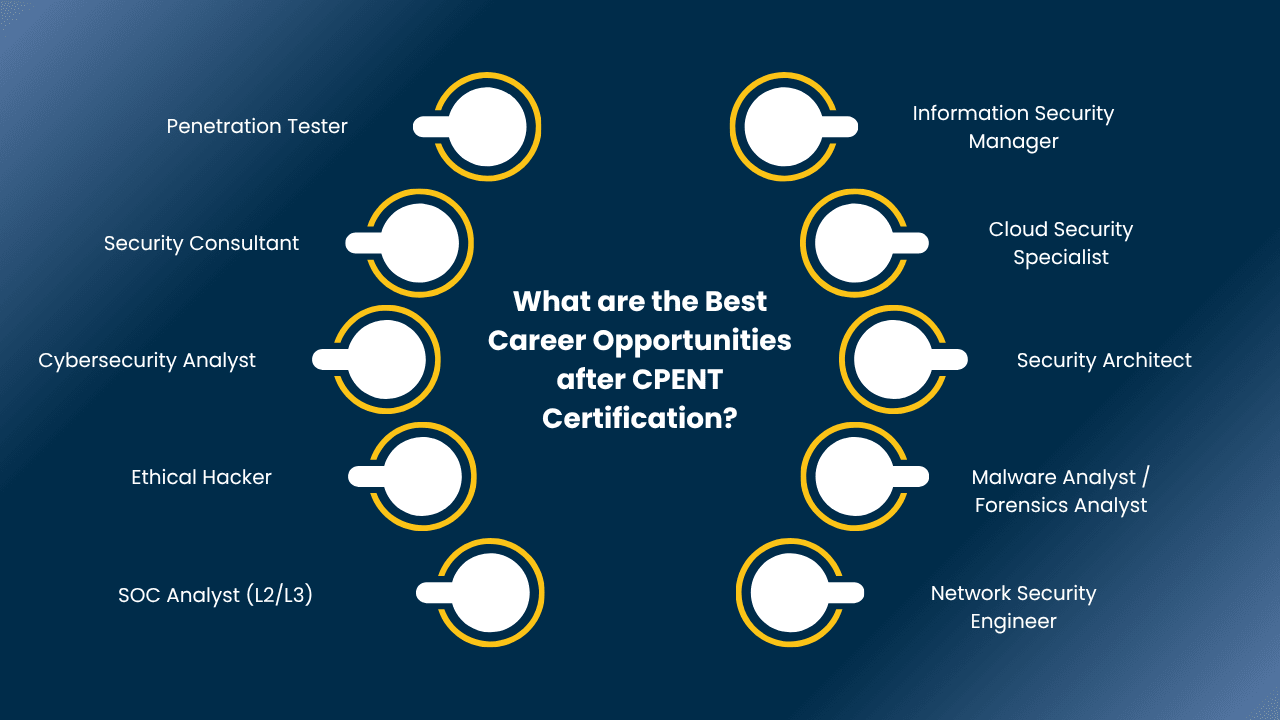Job Opportunities after Penetration Testing Certification in 2025

In today’s cybersecurity landscape, skilled professionals are in high demand especially those who can think like attackers. The C|PENT certification by EC-Council is designed for ethical hackers who want to prove their advanced penetration testing skills in real-world environments.
In this blog, we’ll explore the penetration tester roadmap and the top pent job opportunities after penetration testing certification, how to get CPENT certified, how to become a penetration tester, and why it can be a career-defining move.
What are the Best Career Opportunities after CPENT Certification?
The CPENT (Certified Penetration Testing Professional) certification is made for cybersecurity experts. Individuals who want to excel in advanced penetration testing methodologies in actual environments. Students can have various penetration testing job opportunities after penetration testing certification. Therefore, we have mentioned the list of job opportunities after penetration testing certification in India:
1. Penetration Tester
You can be a penetration tester that will mimic real-world attacks against networks, applications, and systems. You will identify security weaknesses before threat actors exploit them. CPENT training involves hands-on practice for both internal and external penetration testing projects.
2. Security Consultant
You can be a security consultant that will guide companies on how they can secure their digital properties.
3. Cybersecurity Analyst
This is the detection, analysis, and response to threats in real-time. CPENT-certified professionals have an advantage here because of their familiarity with attacker tactics and sophisticated intrusion techniques.
4. Ethical Hacker
Ethical hacking is the most fun job opportunities after penetration testing certification. As an ethical hacker, you test an organization’s defenses legally by simulating cyberattacks. CPENT hones your offensive skills, such as advanced exploitation, evasion, and pivoting techniques.
5. SOC Analyst (L2/L3)
Advanced SOC analysts handle advanced threat detection, incident response, and malware analysis. CPENT provides you with the skill set required for more in-depth investigations and successful responses.
6. Information Security Manager
This leadership position is for managing an organization’s overall security. CPENT certification will enhance your technical expertise and credibility. Which is essential in handling security teams and policies.
7. Cloud Security Specialist
You can be a cloud security specialist after penetration testing certification. You will encompass cloud-based penetration testing, to secure businesses cloud environments.
8. Security Architect
Security architects create secure infrastructure and systems from scratch. CPENT’s emphasis on weakness identification and exploitation best prepares you to foresee and correct potential design vulnerabilities.
9. Malware Analyst / Forensics Analyst
These experts go in-depth into malicious software or digital evidence after security compromises. CPENT’s reverse engineering and exploit development coverage gives a good foundation for these investigative functions.
10. Network Security Engineer
Focused on securing the network layer, this role involves configuring firewalls, intrusion detection systems, VPNs, and more. With CPENT’s in-depth network penetration testing content, you’re prepared to harden and test network defenses with confidence.
How to Get C|PENT Certification?
C|PENT (Certified Penetration Testing Professional) certification is meant for cybersecurity professionals who want to demonstrate their abilities in advanced penetration testing. This certification is a good way forward if you are serious about creating a career in ethical hacking. Here’s how you can get it:

1. Verify the Prerequisites
You don’t need any formal requirement to pass the CPENT exam, but it’s recommended that you:
- Have a good grasp of networking and cybersecurity concepts
- Understand your way around Linux and Windows platforms
- Have some experience with ethical hacking or possess certifications such as CEH
These fundamentals will prepare you well to maximize your training and the tests that lie ahead.
2. Select the Right Training Partner
High-quality training is imperative and that’s where Cybersec Trainings stands. At Cybersec Trainings, you’ll be provided with
- CPENT courses by experts with real-world case studies
- Hands-on challenges and labs that reflect the true exam format
- Trainer guidance that is experienced in the field of offensive security
The training is aimed not only to assist you in passing the exam but also to equip you to face actual penetration testing projects.
3. Understand the Exam Format
Unlike traditional exams, CPENT is entirely hands-on. You’ll face a 24-hour practical exam (you can split it into two 12-hour sessions), where you’ll be challenged to:
- Pen-test enterprise networks, web apps, cloud setups, and IoT systems
- Use advanced techniques like evasion, lateral movement, and pivoting
- Think like a real attacker under pressure
If you are 70% or higher, you will obtain the CPENT certification. You score 90% or more, and in addition to obtaining the CPENT certification, you will also obtain the top-rated LPT (Master) certification.
4. Practice in a Simulated Setting
Cybersec Trainings provides you with fully interactive lab environments that reproduce real-world circumstances. These aid you in acquiring hands-on exposure to tools and techniques you’ll use during the exam.
Training in these simulated environments increases your confidence level, enhances time management, and hones your technical skills.
5. Plan and Schedule the Exam
Once you’re ready, buy your exam voucher and schedule your test through EC-Council’s portal. The examination is proctored online, and therefore, you can take it remotely from anywhere just make sure your setup complies with the technical requirements.
Benefits of Completing C|PENT Certification
The C|PENT certification is not another cybersecurity certificatE. It’s a demonstration of your skill at managing high-stress, actual penetration testing missions. If you’re interested in expanding within your current position or entering into higher-level cybersecurity careers.
Various job opportunities after penetration testing certification is one of the most popular advantage of C|PENT Certification. The following are some straightforward benefits of graduating from the CPENT program:

1. Exhaustive Penetration Testing Knowledge
CPENT encompasses basic network exploitation up to advanced areas such as buffer overflows, evasion methods, Active Directory exploits, and cloud security. It provides you with a profound, hands-on understanding of offensive security, much deeper than theoretical.
2. Real-World Application
The test confronts you with real-world environments that reflect the complexity of today’s enterprise networks. You’re tested on live systems, having to think like a real-world attacker making your skills immediately relevant in the real world.
3. Greater Security Skills
By undergoing CPENT training, you hone your skill to detect vulnerabilities, exploit them in an ethical manner, and apply proper remediation techniques. This enhances not just your penetration testing skills but also your overall cybersecurity acumen.
4. Industry Recognition
C|PENT is provided by EC-Council, a world-renowned organization in cybersecurity training. Possessing this certification immediately elevates your reputation with employers, colleagues, and clients, demonstrating you possess the skills to tackle complicated security audits.
5. Career Opportunities
With CPENT on your resume, the doors are open to high-responsibility and high-paying jobs such as penetration tester, security analyst, red team specialist, and more. It also enhances your prospects for leadership roles or career shifts into specialized areas such as cloud or IoT security.
How to Crack the C|PENT Certification?
Cracking the C|PENT certification isn’t about memorizing answers it’s about mastering practical skills and thinking like a real-world attacker. The exam is intense, hands-on, and time-bound, so success requires strategy, focus, and the right preparation. Here’s how you can boost your chances of passing on your first attempt:
1. Understand the Exam Structure
The CPENT exam is a 24-hour practical challenge that tests your ability to exploit networks, pivot across systems, and compromise environments. You can choose to complete it in one stretch or split it into two 12-hour sessions. Either way, time management and stamina are key.
2. Master the Core Domains
Focus on the topics that are heavily tested:
- Advanced network scanning and enumeration
- Privilege escalation and lateral movement
- Active Directory exploitation
- Web app and cloud penetration testing
- Bypassing security mechanisms
- Custom script development and automation
Don’t just study them practice applying them.
3. Train with the Right Platform
Enroll in a CPENT-focused training program (like the one offered by Cybersec Trainings) that provides:
- Guided video sessions
- Step-by-step walkthroughs
- Real-world labs with complex scenarios
This kind of hands-on learning will prepare you far better than theory-heavy courses.
4. Use the iLabs Smartly
EC-Council provides access to their iLabs, which mimic the exam environment. Spend plenty of time solving challenges in these labs. Try replicating exam conditions work within strict time limits and simulate end-to-end attacks.
5. Brush Up on Scripting
A bit of scripting knowledge (especially in Python, PowerShell, or Bash) goes a long way. You’ll often need to create custom exploits or automate parts of your workflow during the exam.
6. Think Like an Attacker
The exam doesn’t handhold you it expects creativity. Be ready to chain exploits, try alternative paths, and think laterally. If one technique fails, try another. This mindset is often what separates successful candidates from the rest.
7. Stay Calm Under Pressure
The CPENT exam is long, mentally exhausting, and highly technical. But staying calm and methodical can make a big difference. Don’t panic if something doesn’t work step back, reassess, and try a different approach.
Conclusion
The C|PENT certification validates your ability to handle real-world penetration testing challenges. Additionally it opens many doors to job opportunities after penetration testing certification. With the right training and hands-on practice, you can pass the exam and fast-track your career in offensive security.
If you’re ready to take that next step, CPENT is one of the best certifications to prove your skills and stand out in the cybersecurity job market.
Understand how Orbus can help your career!
Speak with an Expert Now!
FAQ's
Can I get a job with PenTest+?
Yes, the CompTIA PenTest+ certification can definitely help you get a job as a penetration tester jobs for freshers or related cybersecurity roles.
What is the career path after pentesting?
After gaining experience as a penetration tester. You can advance to roles like lead penetration tester, security manager, or even move into executive cybersecurity roles. Penetration tester job description is like CISO, or explore specializations like exploit development or incident response.
Is penetration testing a good career?
Yes, penetration testing can be a good career. It's also an in-demand, high-paying career path.
How much does a certified penetration testing professional earn?
The salary of a Penetration Tester in India varies based on experience, location, company & Industry. Although, penetration tester salaries range from ₹2.0 Lakhs to ₹18.8 Lakhs per year.
How long does it take to become a pen tester?
Becoming a penetration tester usually takes anywhere from 1 to 4 years of experience in IT or cybersecurity, along with the right certifications and a solid understanding of computer security fundamentals.





